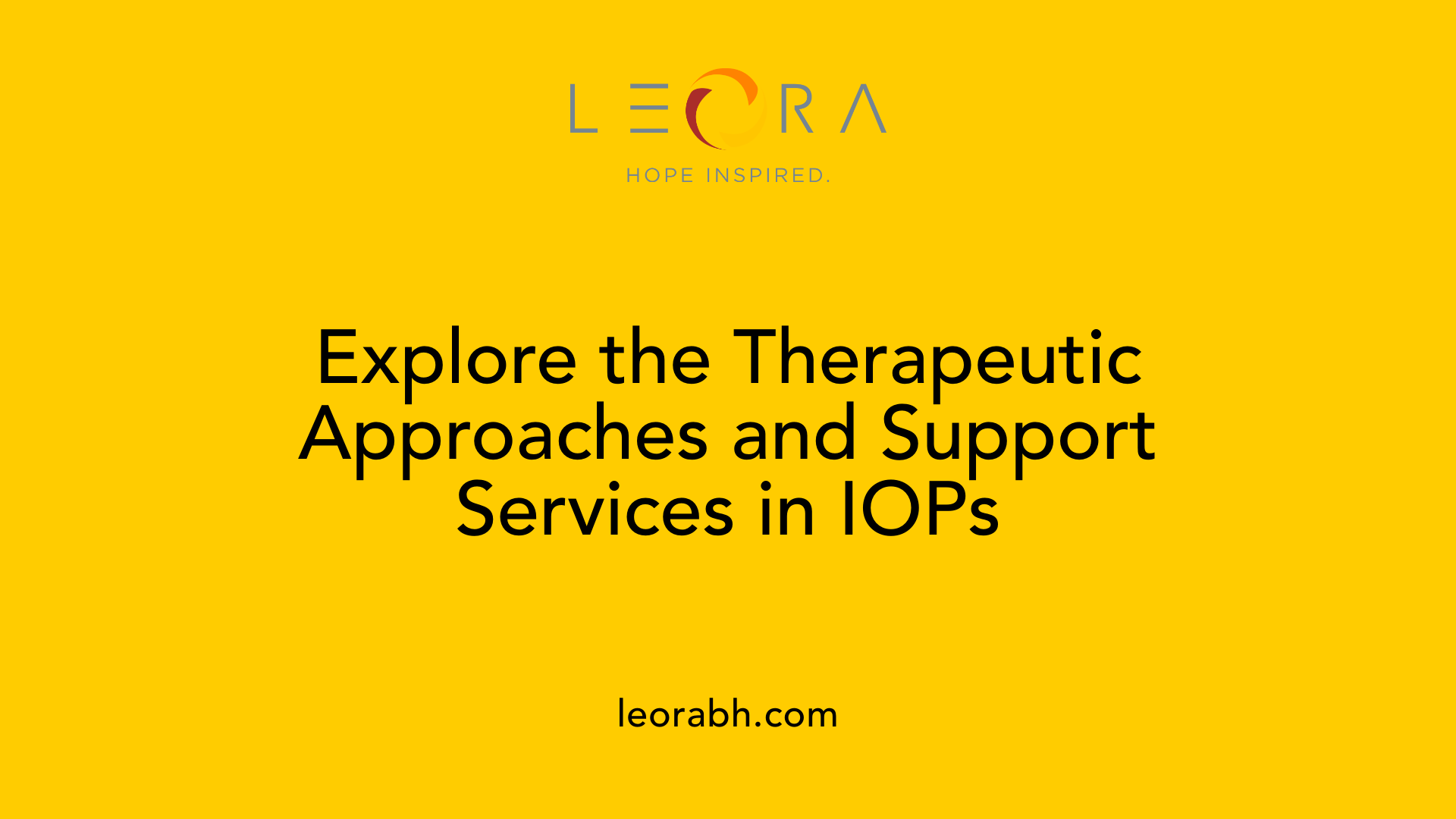What to Expect in a Substance Use Disorder Intensive Outpatient Program
Understanding the Structure and Benefits of SUD Intensive Outpatient Programs
An In-Depth Look at What Participating in an IOP Entails
Substance Use Disorder (SUD) Intensive Outpatient Programs (IOPs) serve as a critical bridge in recovery, offering structured, comprehensive treatment that allows individuals to maintain their daily responsibilities while focusing on sobriety and mental health. This article explores the key components, therapy types, selection criteria, and what participants can expect during their recovery journey, providing clarity for those considering this treatment option.
Core Components of an IOP for Substance Use Disorder

What are the key components of treatment in an IOP for substance use disorder?
An Intensive Outpatient Program (IOP) for substance use disorder includes several essential treatment elements designed to support recovery while allowing patients to maintain their daily responsibilities.
First, comprehensive assessments are conducted to develop personalized treatment plans. These evaluations often involve physical health exams, psychosocial assessments, and screenings for co-occurring mental health conditions. Tailoring the program to individual needs ensures that each patient receives appropriate interventions.
Evidence-based therapies form the backbone of IOP treatment. Common approaches include cognitive-behavioral therapy (CBT), which helps individuals identify and change thought patterns related to substance use. Motivational interviewing enhances motivation to sustain change, while relapse prevention strategies teach skills to handle triggers and high-risk situations.
The program also incorporates individual and group counseling. Individual sessions, usually scheduled weekly or bi-weekly, create a safe space for patients to explore personal issues, emotional regulation, and underlying causes of addiction. Group therapy fosters peer support, education, and shared experiences, which are vital to building a sober community.
Family involvement is encouraged to strengthen the support system around the patient. Family counseling sessions educate loved ones about addiction, improve communication, and develop collective strategies to support ongoing recovery.
Medication management may be included to address co-occurring mental health conditions or dependency issues. Medical providers may prescribe medications such as methadone, buprenorphine, or antidepressants, but these are typically not stored on-site and are administered outside the program.
Ongoing monitoring is crucial for ensuring progress. Regular drug screenings, such as urinalysis, verify abstinence and help adjust treatment plans as needed. Flexibility in treatment allows providers to escalate or de-escalate interventions based on recovery milestones.
Finally, support extends beyond therapy through psychoeducation, life skills training, and relapse prevention planning. Programs often involve family and support groups like 12-step meetings, further embedding support networks for long-term sobriety.
By combining these components—thorough assessments, evidence-based therapies, personalized counseling, familial support, medication if needed, and continuous monitoring—an IOP offers a structured yet flexible pathway for individuals seeking recovery from substance use disorders.
Therapeutic Modalities and Support Services in IOPs
 An Intensive Outpatient Program (IOP) offers a comprehensive array of therapies and support services tailored to help individuals battling substance use disorder (SUD) and co-occurring mental health conditions. Central to these programs are evidence-based approaches such as Cognitive-Behavioral Therapy (CBT), Motivational Interviewing (MI), Dialectical Behavior Therapy (DBT), and 12-Step facilitation. These modalities are designed to foster relapse prevention, emotional regulation, effective communication, and the development of coping skills.
An Intensive Outpatient Program (IOP) offers a comprehensive array of therapies and support services tailored to help individuals battling substance use disorder (SUD) and co-occurring mental health conditions. Central to these programs are evidence-based approaches such as Cognitive-Behavioral Therapy (CBT), Motivational Interviewing (MI), Dialectical Behavior Therapy (DBT), and 12-Step facilitation. These modalities are designed to foster relapse prevention, emotional regulation, effective communication, and the development of coping skills.
Group therapy forms a fundamental part of IOPs, often employing models like psychoeducational groups, skills-development sessions, and relapse prevention workshops. These models encourage peer support, shared learning, and social connection, which are crucial for long-term recovery. Each group session is structured to focus on education about addiction, managing triggers, and building resilience.
Individual and family counseling are also integral components. Personalized sessions are conducted to address specific issues, explore underlying causes of addiction, and involve family members in the recovery process. Family therapy helps educate loved ones about addiction and facilitates a supportive environment at home.
Medication management and case oversight are available as needed, with licensed providers tailoring pharmacological interventions to optimize mental health outcomes. Psychiatric assessments help determine if medications like antidepressants or anti-craving agents are appropriate.
Holistic therapies such as mindfulness training, yoga, art therapy, and recreational activities like music therapy are incorporated to promote overall well-being. These activities support emotional expression, reduce stress, and improve mental health, complementing traditional therapies.
By combining these diverse treatment strategies, IOPs aim to facilitate long-term sobriety, teach valuable life skills, and empower individuals to successfully reintegrate into their daily lives while maintaining ongoing support.
Structure, Schedule, and Duration of IOPs
 Intensive Outpatient Programs (IOPs) are designed to provide substantial support for individuals facing substance use disorder (SUD) while allowing them to live at home and manage their daily responsibilities. Typically, participants attend between 9 and 15 hours of treatment weekly, structured into multiple sessions throughout the week.
Intensive Outpatient Programs (IOPs) are designed to provide substantial support for individuals facing substance use disorder (SUD) while allowing them to live at home and manage their daily responsibilities. Typically, participants attend between 9 and 15 hours of treatment weekly, structured into multiple sessions throughout the week.
The common schedule involves three sessions per week, with each lasting about three hours. These sessions may be held in the evenings or during the day, depending on the individual's availability and the program's offerings. Some programs also provide virtual options, increasing accessibility for clients who cannot attend in person.
The duration of IOPs varies widely, with most lasting from around 8 to 12 weeks. Certain programs extend beyond this period, sometimes up to 6 months or more, especially if ongoing support is needed. The length is tailored based on the individual's recovery progress and specific needs.
This flexible structure is especially beneficial for those transitioning from inpatient care or those seeking less intensive treatment that still offers comprehensive therapeutic support. Initial assessments help craft individualized treatment plans, ensuring that therapy components—such as group counseling, individual therapy, psychoeducation, and family involvement—align with the person's recovery goals.
Overall, IOPs are designed to balance intensive treatment while supporting the client’s ongoing life commitments, making recovery more sustainable and integrated into everyday life.
Participant Experience and What to Expect

How does the recovery journey unfold?
An Intensive Outpatient Program (IOP) offers a structured yet flexible path toward recovery from substance use disorder or mental health conditions. Participants typically begin with thorough assessments to tailor the treatment plan to their individual needs. Throughout the program, they engage in therapy sessions designed to understand and manage their addiction or mental health symptoms. The journey emphasizes building resilience, understanding triggers, and developing long-term coping skills.
As they progress, individuals learn to balance treatment with daily responsibilities, such as work, school, or family life. The duration varies but often spans 8 to 12 weeks, during which participants gradually strengthen their recovery foundation. Successful engagement in IOPs helps individuals transition to less intensive outpatient care or maintain abstinence while reintegrating into their routines.
What is a typical therapy routine?
Participants attend several hours of therapy weekly, often in three-hour group sessions three times a week. These sessions include a mix of group therapy, individual counseling, psychoeducation, and family involvement when appropriate. The therapies used can include Cognitive-Behavioral Therapy (CBT), Motivational Interviewing (MI), or family behavior therapy, all aimed at fostering behavioral change and emotional regulation.
Many programs also incorporate holistic activities such as yoga, art, or mindfulness techniques to enhance emotional well-being. Virtual options are increasingly available, providing flexibility for those unable to attend in person.
How do individuals build coping skills?
A central focus of IOPs is teaching effective coping strategies. Participants learn to recognize emotional triggers, manage cravings, and develop skills like stress management, effective communication, and problem-solving. These skills are reinforced through role-playing, homework exercises, and ongoing support in group settings.
Relapse prevention is also a critical component, where participants are trained to identify early warning signs and utilize their coping toolkit to maintain sobriety. Family and peer support sessions further solidify these skills and promote a supportive recovery environment.
What role do family and peer support play?
Family involvement is often encouraged, with education sessions to help loved ones understand addiction and how they can support recovery. Family therapy sessions facilitate improved communication and rebuild trust.
Peer support is integral, with connections made during group therapy and support groups like AA or NA. These relationships provide shared understanding, accountability, and ongoing encouragement beyond the structured program.
An IOP aims to create a safe, supportive, and stigma-free environment where individuals feel empowered to regain control over their lives, equipped with the skills and support systems necessary for lasting recovery.
Choosing the Right Candidates for an IOP

Who are suitable candidates for an IOP?
Suitable candidates for an Intensive Outpatient Program (IOP) are individuals dealing with moderate substance use or mental health issues that interfere with their daily life, but who do not need the structured environment of inpatient hospitalization.
These individuals often have a stable home environment and support systems, making it possible for them to participate fully in therapy while managing responsibilities like work or school.
Candidates who have recently completed inpatient detox or hospital care are often ideal because they are stabilized but still need additional support for ongoing recovery.
A core factor is motivation and commitment. Those who are eager to maintain sobriety and are willing to actively engage in therapy sessions tend to succeed in IOPs.
Assessment criteria typically include a thorough medical and psychosocial evaluation by healthcare professionals. These evaluations determine if the person's symptoms and circumstances align with the level of care that an IOP offers.
People with co-occurring mental health disorders, mild psychological symptoms, or emotional and behavioral challenges can benefit from an IOP, especially if their conditions are stabilized through medications or therapies.
In summary, suitable candidates are generally those who can uphold regular attendance, manage their daily obligations, and have a supportive environment conducive to recovery. Proper assessment ensures they are placed in a program that best supports their ongoing health and wellness.
Goals, Outcomes, and Long-Term Benefits of Participating in an IOP

What are the goals and expected outcomes of participating in an IOP?
Intensive Outpatient Programs (IOPs) are designed to provide structured treatment for individuals dealing with substance use disorders and co-occurring mental health issues. The main goal of an IOP is to help participants stabilize their mental health and reduce substance use symptoms while living at home and continuing daily responsibilities such as work or school.
Participants in IOPs focus on developing effective coping strategies to handle emotional triggers and stressors that may lead to relapse. The programs incorporate therapies like cognitive-behavioral therapy (CBT), motivational interviewing, psychoeducation, and sometimes medication management, tailored to individual needs.
A crucial aspect of IOPs is building a strong support network involving therapy groups, family participation, and community support groups like AA or NA. This network offers ongoing encouragement and accountability, vital for long-term recovery.
Expected results from engaging in an IOP include a significant reduction or stabilization of mental health symptoms, improved management of triggers, and better emotional regulation. The goal is to help individuals transition smoothly back into independent living and routine life, equipped with the skills needed to maintain sobriety.
Person-centered treatment plans are a cornerstone, as they help address unique challenges faced by each person. The emphasis on skill development, ongoing support, and relapse prevention prepares participants not just for initial recovery but for lasting sobriety and improved overall functioning.
Ultimately, IOPs aim to enable individuals to enjoy sustained recovery, increased life stability, and resilience in real-world situations, reducing the likelihood of relapse and promoting a healthier, balanced lifestyle.
Embracing the Path to Recovery through Structured Support
Participation in an Intensive Outpatient Program offers a balanced approach to recovery, blending professional treatment, peer support, and personal responsibility. By understanding the typical structure, therapies, and expected outcomes, individuals can better prepare for their journey. IOPs serve as a vital step in achieving sober living, emotional stability, and long-term well-being, emphasizing that recovery is a continuous process rooted in ongoing support and community engagement.
References
- Intensive Outpatient Program (IOP): What Is It & Find IOPs Near Me
- Intensive Outpatient Program for Addiction - Henry Ford Health
- What Happens During An Intensive Outpatient Program (IOP)?
- Recovery Works (Intensive Outpatient Program)
- Intensive Outpatient Programs in Illinois - Gateway Foundation
- Intensive Outpatient Treatment | New Orleans, LA
- How an Intensive Outpatient Program (IOP) Works - Verywell Mind
- What Happens In Inpatient Substance Abuse Programs
Find Your Inner Light
Related Articles
Schedule an Assessment
Leora Behavioral Health provides comprehensive treatment services, including ambulatory detox, mental health IOP, and SUD IOP, to support your journey toward lasting recovery.
Our caring team will guide you through the admissions process and create a personalized treatment plan tailored to your unique needs. We welcome walk-ins. If you or a loved one is struggling, reach out today. We’re here to help.


.svg)




.svg)
.svg)
.svg)
.svg)
